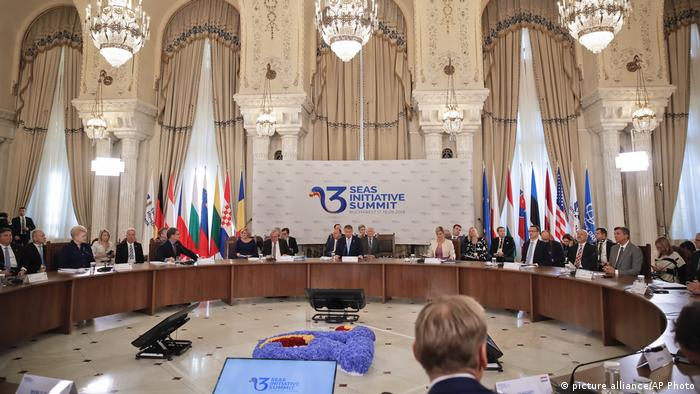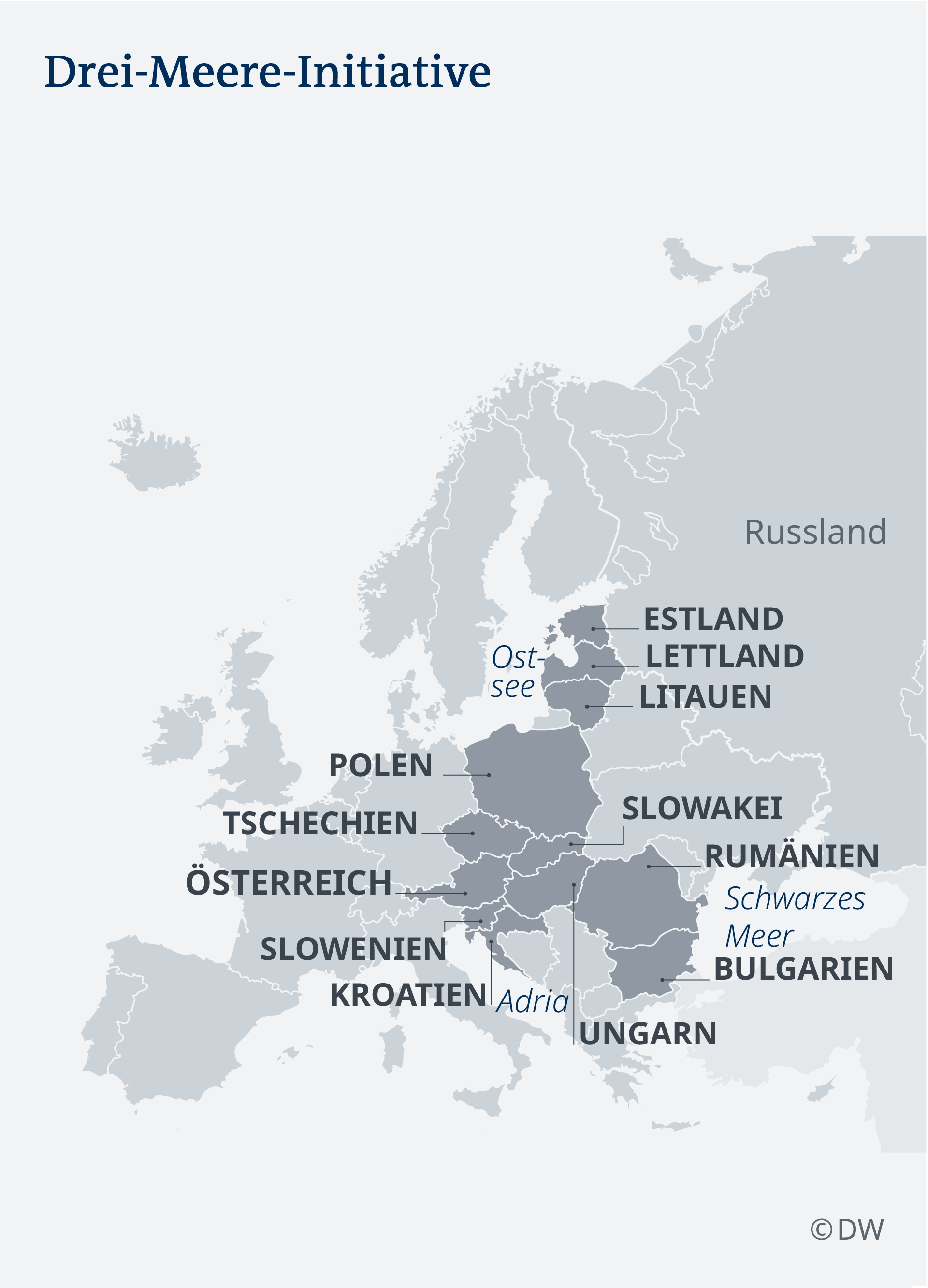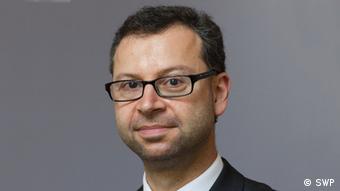After initial scepticism, Germany supports the Initiative in the East of the EU, Federal President of Germany, Steinmeier is traveling to Meet the group in Ljubljana. Because the Region is the geo-strategic focal point of the great powers.

In the past year, representatives of the Three seas Initiative in September, met in Bucharest
The three seas, the Baltic, the Adriatic and the Black sea. In 2015, Poland and Croatia called this loose Federation of twelve EU countries in the Eastern half of the European Union, from Estonia in the North to Croatia in the South and Romania and Bulgaria in the East. What are the countries combined: All are members of the EU and Austria, all from 2004, joined.
Aims at strengthening cooperation, especially in the areas of infrastructure, energy and security. The members feel themselves not only from Russia, threatened and want to be in their energy supply more independent of Russian supplies. They also believe that their interests within the EU, to little hearing. Relatively light political weight, partly for economic reasons: Namely, the countries of the Three seas Initiative, which make up about a quarter of the area and of the inhabitants of the EU, they earn only ten per cent of the EU gross national product.

Twelve countries between the Baltic, Adriatic and Black sea are combined in the Three-seas Initiative
Together, the calculus, you can reach in Brussels. Also, you want to expand the transport connections with each other, because, as the political scientist Kai-Olaf Lang of the Berlin science and politics Foundation (SWP): “In contrast to the East-West Connections there is a lack of North-South corridors.”
Dispute about Nord Stream 2
In Berlin you have viewed the Initiative disinterested rather to suspicion. The Federal government feared a further split in the European Union in the East and the West, which is in the migration policy is already large. Fierce dispute between Berlin and the members of the Initiative, there was also the gas pipeline Nord Stream 2, which should bring even more Russian Gas through the Baltic sea directly to Germany.

President Trump seized in 2017 in Warsaw open party for Eastern Europeans, and against Germany in the natural gas question
As the second Meeting of the Three seas Initiative in July 2017 in Warsaw, even Donald Trump took part, he took in the natural gas question open party against Germany. The US President criticized, Berlin’m too dependent on Russia. The US, however, own interests: Beyond the political Dimension, you see Eastern Europe as a potential market for their LNG.
Germany wants to get out of the spectator role
The CDU foreign policy expert Roderich Kiesewetter pulls out of the dispute the following conclusion: “It was a clear sign to advise national, as economically projects considered earlier with the EU partners. Unfortunately, has been the time not used, distrust prevent it.” The dispute about Nord Stream 2 have shown “significantly, the importance of energy policy for the cohesion of the EU. The Eastern Europeans have a great sensitivity to this issue, and the need to take Germany seriously.”

CDU politician Roderich Kiesewetter
The incident was also a Wake-up call of a different kind. In Berlin, you have now realized, that not only the US-American geo-strategic reasons, amplified for the Region of interest. China is aggressive with his Investment more and more present, while Russia is pursuing its strategic interests there. With its close economic ties to the countries of the Initiative, Germany would not longer stand on the sidelines. “You don’t want to just watch,” says Kai-Olaf Lang, “but we know that the infrastructure projects also have an external Dimension.”
Berlin to controls
Last year, Berlin took a swing: the foreign Minister Heiko Maas went to the third meeting of the Three seas Initiative to Bucharest. He announced that, in accordance with the policy of détente under Chancellor Willy Brandt in the 1970s, a “new Ostpolitik” and said Germany wanted to be “a bridge-Builder and Moderator in the spirit of European unity”.
Maas even applied for full membership of Germany in the group of States. The response was divided. While the then host Romanian President Klaus Iohannis, supported the request and rebuked the Polish Prime Minister Mateusz Morawiecki, the offer by note. And only if all members agree, Germany can join.
Also EU shows interest
Now the Federal government adds the fourth Meeting in the Slovenian city of Ljubljana even more, by Federal President of Germany Frank-Walter Steinmeier takes part. The European Union is interested also strengthened for the Initiative. Along with Maas, President Jean-Claude Juncker was last year in Bucharest Commission. Also for this Time, he has announced.

EU Commission President Jean-Claude Juncker (l) and foreign Minister Heiko Maas in September 2018 in Bucharest
A sign that the European Commission, the Initiative is not in competition with the EU. Juncker also supports the German desire for a membership. Long believes: “most Likely, Germany will not be a full member of the Initiative, would that change your character.” Berlin wool, but to signal its willingness to cooperate.
A financing Fund is intended to help
So far, the balance of the Three seas-the Initiative looks modest, says Long. The cooperation between the countries was “vague and, specifically, happened a lot”. This could change, however, with the establishment of a Fund, the joint infrastructure Fund projects. This Fund was launched only a few days ago, a Polish commercial Bank and is to be led by Poland, Romania and the Czech Republic. So far, the financial volume is around 500 million Euro, a target of four to five billion.

Kai-Olaf Lang from the Stiftung Wissenschaft und politik
In the 1930s there was already an Initiative under Polish leadership, with the Ukraine as a member. You should be both a protection against the Soviet Union under Joseph Stalin as well as against national socialist Germany under Adolf Hitler. From such a historical and geostrategic Parallel, the initiators of the Three-oceans-Initiative want to know but nothing and stress the economic importance.
Such informal networks have always “a geo-strategic Dimension”, stresses Kai-Olaf Lang, contrary to the denials from the ranks of the Three seas Initiative. In Berlin, you have recognized it, especially because today, even China and Russia have a greater interest in the Region. The conclusion of the political scientist: “the awareness of the relevance of this part of Europe is also increasing in the EU and in Germany”.

